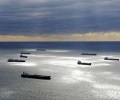

HMM has endured major hardships over the years, such as the global oil shock and price war, which bankrupted some key players in the industry.
The firm, previously known as Hyundai Merchant Marine, was also hit hard by the fierce price competition that resulted in financial troubles, with the state-run Korea Development Bank (KDB) ending up taking over the firm in December 2017. Despite these challenges, the company is starting to turn a decade of losses into profits and many conglomerates are vying for a chance to take over the country’s leading marine shipping company.
With its recent successes, all eyes are on who the next owner will be for HMM. But as the stock prices of the shipping company have been soaring since last year, this also places a major burden on prospective buyers. Due to the rising prices, industry watchers believe only major conglomerates stand a chance at acquiring HMM.
POSCO Group has been seen as a preferred candidate by many, as it has enough cash on hand to pay for an acquisition and it is seeking to establish an affiliate in the distribution sector. Other candidates are Hyundai Motor Group, Hyundai Heavy Industries Group and HDC Group, as well as CJ Group.
Last year, HMM recorded 6.41 trillion won in sales, an increase of 16.3 percent from the previous year. Operating profit hit 980.8 billion won, recording its first profit since 2010.
In the first quarter of this year, the company saw a boom in marine transportation recording 2.42 trillion won in sales, which is an increase of 84.9 percent from the same period last year. Operating profit hit 1.19 trillion won taking up 42 percent of total sales.
According to the Korea Exchange, after the start of the COVID-19 pandemic, HMM had the highest increase in market capitalization among the firms listed here. HMM’s market capitalization hit its low of 693.2 billion won in March last year, but surged to 16.1 trillion won at market close, Monday, priced at 48,100 per share.
However, the rise in stock prices will only become a burden for prospective buyers as the cost of acquisition also rises simultaneously. KDB’s roughly 41.2 million shares were worth approximately 1.98 trillion won as of end of market close, Monday.
Source: The Korea Times